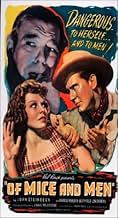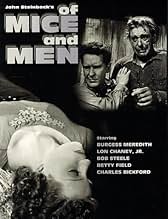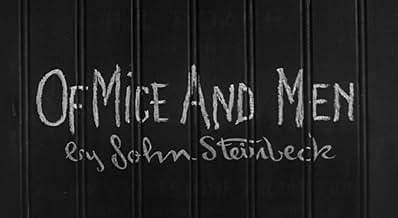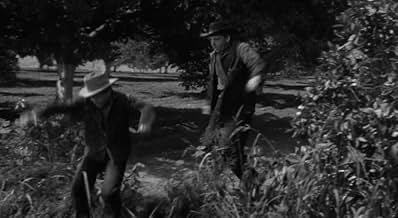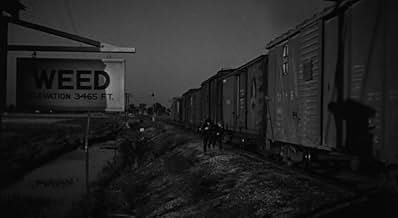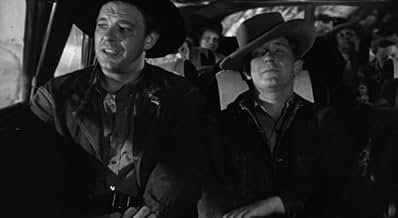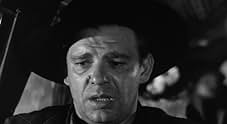CALIFICACIÓN DE IMDb
7.8/10
7.3 k
TU CALIFICACIÓN
Un gigante con discapacidad mental y su guardián sensato encuentran trabajo en un rancho de vaqueros sádicos en la era de la depresión en Estados Unidos.Un gigante con discapacidad mental y su guardián sensato encuentran trabajo en un rancho de vaqueros sádicos en la era de la depresión en Estados Unidos.Un gigante con discapacidad mental y su guardián sensato encuentran trabajo en un rancho de vaqueros sádicos en la era de la depresión en Estados Unidos.
- Dirección
- Guionistas
- Elenco
- Nominado a 4 premios Óscar
- 5 premios ganados y 4 nominaciones en total
Henny Backus
- Girl
- (sin créditos)
Silver Tip Baker
- Old Hand
- (sin créditos)
John Beach
- Ranch Hand
- (sin créditos)
Baldwin Cooke
- Ranch Hand
- (sin créditos)
Whitney De Rahm
- Ranch Hand
- (sin créditos)
Eddie Dunn
- Bus Driver
- (sin créditos)
Jack Lawrence
- Ranch Hand
- (sin créditos)
Opiniones destacadas
I don't think anybody who has read "Of Mice and Men" has ever forgotten it. John Steinbeck paints characters who are so rich, so sympathetic, so tragic. I went through a brief Steinbeck phase during my highschool years, and every single novel – "The Grapes of Wrath," "The Pearl," "The Winter of Out Discontent," "The Red Pony" - left me feeling emotionally gutted. His conclusions are tragic and sorrowful, and yet somehow necessary - the only possible conclusion.
I've seen Gary Sinise's 1992 film adaptation of "Of Mice and Men," and it's a very strong, faithful adaptation, but this one tops it, I think. Snappy, shrewd George is played by Burgess Meredith, and he has a wonderful rapport with Lennie (Lon Chaney, Jr.), a behemoth with more heart than brains.
The characterisations are poignant, and the dialogue strongly literary, often lifted straight from the pages of the source material. Steinbeck has a delicate way of giving his characters hope, and then sharply yanking it away for the conclusion. This goes against every rule of Hollywood storytelling (even John Ford's 'The Grapes of Wrath (1940)' compromised with a more optimistic ending), but here director Lewis Milestone sticks to the original story like it was gospel.
I've seen Gary Sinise's 1992 film adaptation of "Of Mice and Men," and it's a very strong, faithful adaptation, but this one tops it, I think. Snappy, shrewd George is played by Burgess Meredith, and he has a wonderful rapport with Lennie (Lon Chaney, Jr.), a behemoth with more heart than brains.
The characterisations are poignant, and the dialogue strongly literary, often lifted straight from the pages of the source material. Steinbeck has a delicate way of giving his characters hope, and then sharply yanking it away for the conclusion. This goes against every rule of Hollywood storytelling (even John Ford's 'The Grapes of Wrath (1940)' compromised with a more optimistic ending), but here director Lewis Milestone sticks to the original story like it was gospel.
This screen adaptation of the John Steinbeck classic novel is a harsh, fantastic film that took the wind out of me with its frank and brutal depiction of desperation and longing. Movies about the Depression that were actually made at the time of the Depression by people who knew of what they spoke by necessity feel so much more authentic than later movies that treat the Depression as a historical event. The men in this film are quite literally living day to day, and the comparison of men to dogs that serves as a running motif throughout the film feels like more than just a poetic device. Like dogs, these men were faced with the scary prospect of some day being of no more use, and there was no system in place to take care of them when that day came. Being shot like a dog put out of its misery by its owner really was preferable to the alternatives awaiting them.
I was surprised about how candid this film was, and how bravely it tackled some of the thornier issues of Steinbeck's novel. The incident between Lenny and Mae is divested of some of its sexual overtones, but much is implied anyway. And a scene between Crooks, a black work hand, and some of the other workers, in which Crooks explains in blunt language what it means to be black, tackles race relations as honestly as many films today.
Moments of this film are almost unbearably sad and poignant, but never in that over-sentimental way common to Hollywood films of this time period. Burgess Meredith is terrific in the role of George; he expertly conveys--without ever directly addressing it--the bond he has with Lenny and the degree to which Lenny is as much George's savior as he is Lenny's. Charles Bickford is also excellent as a rough and world-weary worker. The cast's weak links are Betty Field--hopelessly overplaying her bored sex kitten--and Lon Chaney as Lenny, though both are very good in the pivotal scene that sets off the action of the film's finale.
John Ford's adaptation of "The Grapes of Wrath" from the following year gets all of the attention today, and one hardly ever hears of "Of Mice and Men." But much of what is great about Ford's film is also great about Lewis Milestone's, and he deserves credit for laying a fine blueprint for brining Steinbeck's beautiful and heartbreaking stories to the screen.
Grade: A
I was surprised about how candid this film was, and how bravely it tackled some of the thornier issues of Steinbeck's novel. The incident between Lenny and Mae is divested of some of its sexual overtones, but much is implied anyway. And a scene between Crooks, a black work hand, and some of the other workers, in which Crooks explains in blunt language what it means to be black, tackles race relations as honestly as many films today.
Moments of this film are almost unbearably sad and poignant, but never in that over-sentimental way common to Hollywood films of this time period. Burgess Meredith is terrific in the role of George; he expertly conveys--without ever directly addressing it--the bond he has with Lenny and the degree to which Lenny is as much George's savior as he is Lenny's. Charles Bickford is also excellent as a rough and world-weary worker. The cast's weak links are Betty Field--hopelessly overplaying her bored sex kitten--and Lon Chaney as Lenny, though both are very good in the pivotal scene that sets off the action of the film's finale.
John Ford's adaptation of "The Grapes of Wrath" from the following year gets all of the attention today, and one hardly ever hears of "Of Mice and Men." But much of what is great about Ford's film is also great about Lewis Milestone's, and he deserves credit for laying a fine blueprint for brining Steinbeck's beautiful and heartbreaking stories to the screen.
Grade: A
8bux
Steinbeck's classic story of 'my brother's keeper' brought to the silver screen in a reverent manner. Perhaps the biggest story in this film is the fact that Chaney jr. could REALLY act-he was undoubtedly cheated out of the Oscar for best actor. Merideth, best known to younger folks as Rocky's trainer does a fine job as the brains in this two man operation. Veteran cowboy star Bob Steele does a stand-out job as the heavy. The direction is steady and the script lifted literally from the novel(why improve perfection?) Remade several times, but never as effectively. Even if you've seen it 100 times, keep a hankie handy.
10artzau
The first comment given here shows an incredible lack of understanding of Steinbeck in his California period. Our Irish friend's acrid comments show he obviously doesn't like Steinbeck and that's his privilege. Now, having said that, I must say he's wrong. This film is excellent. Just that. The cast is wonderful and the story is a classic: the destruction of innocence by cruel reality (viz: the title of the story taken from a line from a Robert Burns's poem). And, while Steinbeck was not one to let a sentimental moment pass by, e.g, Lennie's Christ-like innocence, inappropriate super-human strength which inadvertently wreaks havoc resulting in his euthanasia with the same instrument as used for Curley's dog, these scenes are never maudlin. Too, for the serious Steinbeck fan, there's more, much more. This story, and the play, created at Steinbeck's most experimental period, is fraught with symbolism. There's the "big" guy, a victim of the "little" guy's vanity. Many are not aware that Steinbeck was small (5'3") and very self-conscious about his size. The cast is outstanding: Betty Field's careless and bored character, Mae contrasts with the mighty innocence of Chaney's Lennie. There are the solid characters of Bickford's Slim, Meredith's George and Bohnen's Candy; Steele was at his best as the vain, pugnacious Curley; Veteran character actor, Noah Berry Jr. as Whit adds another element of sympathy. This is one of our American classic films. We invented and developed this genre of art and this film must stand as one of its finest examples.
This is wonderful film! I loved it! Why Lon Chaney Jr. did not win the oscar for his portrayel of Lenny, I'll never know. He was perfect in that role. One of my favorite scenes is when they have to kill Candy's dog. Just the emotion from everyone is.. just amazing. You have to cry everytime you see it. Wonderful movie that is probably the best one to come from a novel. John Steinbeck should be proud of this one. I know I'd be. 10/10.
¿Sabías que…?
- TriviaOne of the first films to have a pre-credits opening sequence.
- ErroresAt the beginning, when George and Lennie are being chased, they are running alongside a train, then climbing inside. As they run, the shadow of the camera operator, wearing a cap, can be seen against a train car.
- Citas
George Milton: It ain't your fault, but look, if a fella steps on a round pebble and he falls down, breaks his neck, it ain't the pebble's fault, but the guy wouldn't a done it if the pebble hadn't been there.
- Créditos curiososThe movie begins before the credits are shown. George and Lennie are fleeing a mob. They board a moving freight train boxcar. As they close the door, we see the prologue as if written in chalk on the side of the boxcar. The words 'Of Mice and Men' then are highlighted, the rest of the words fade out, creating the opening title sequence with credits following, all written out.
- ConexionesFeatured in Brother Can You Spare a Dime (1975)
Selecciones populares
Inicia sesión para calificar y agrega a la lista de videos para obtener recomendaciones personalizadas
Detalles
- Tiempo de ejecución1 hora 46 minutos
- Color
- Relación de aspecto
- 1.37 : 1
Contribuir a esta página
Sugiere una edición o agrega el contenido que falta

Principales brechas de datos
By what name was La fuerza bruta (1939) officially released in India in English?
Responda

